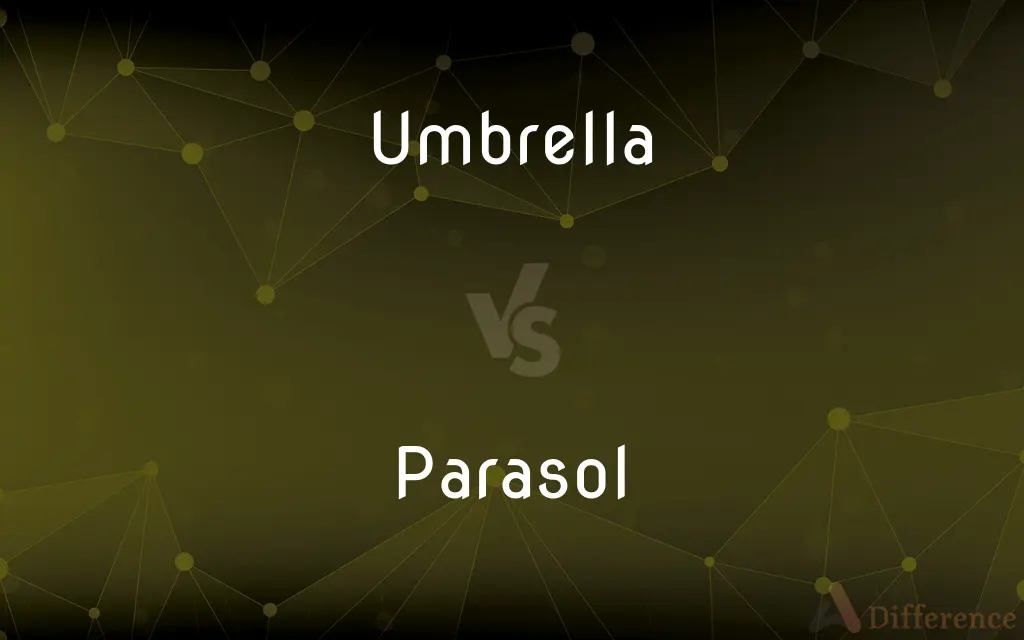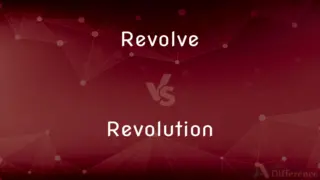Umbrella vs. Parasol — What's the Difference?
By Tayyaba Rehman — Updated on October 11, 2023
An umbrella is primarily used to protect from rain, while a parasol shields from the sun. Both offer cover, but serve different weather conditions.

Difference Between Umbrella and Parasol
Table of Contents
ADVERTISEMENT
Key Differences
An umbrella is a foldable protective device, commonly seen in rainy conditions. It's designed to shield individuals from getting wet. Parasols, on the other hand, are specifically meant to provide shade and protect users from the sun's rays, often seen at beaches or sunny outdoor events.
While both umbrellas and parasols have a similar construction, with a canopy supported by ribs and a central pole, the materials can differ. Umbrellas tend to be made from waterproof materials to effectively repel water. Parasols, conversely, might be crafted from fabrics that are not necessarily waterproof but are effective in blocking UV rays.
The word "umbrella" can also signify broader coverage or protection in various contexts, while "parasol" typically remains confined to its sun-shielding meaning. For instance, the phrase "under the umbrella of" might suggest being under a protective or encompassing authority or system.
From a historical perspective, parasols have been symbols of luxury and status in certain cultures, signifying the bearer's avoidance of direct sun. Umbrellas, while they have ancient roots as well, are now more functionally associated with the practical necessity of staying dry.
While umbrellas are generally built sturdy to withstand wind and rain, parasols might be more delicately constructed, focusing on aesthetics as they are often seen as fashion accessories in addition to their sun-blocking function.
ADVERTISEMENT
Comparison Chart
Primary Purpose
Rain protection
Sun protection
Material
Waterproof
Not always waterproof
Symbolism
Protection from elements
Luxury, sun-shading
Construction
Sturdy, for wind/rain
Often more delicate
Broader Usage in Language
Yes (e.g., umbrella term)
Typically specific to sun-shielding
Compare with Definitions
Umbrella
A device for protection against rain.
She opened her umbrella as it began to drizzle.
Parasol
A non-waterproof shade provider.
The parasol provided shade, but wasn’t much help when it started raining.
Umbrella
An item with waterproof material.
Make sure to pack an umbrella; it's going to rain.
Parasol
A device designed to shield from the sun.
She carried a parasol to protect her skin.
Umbrella
A foldable canopy with a central pole.
The wind turned his umbrella inside out.
Parasol
A symbol of leisure and luxury in history.
In old paintings, nobility often posed with a parasol.
Umbrella
A symbol of overarching protection.
The new policy falls under the umbrella of the health initiative.
Parasol
A light umbrella used to give shade from the sun.
Umbrella
An accessory offering coverage from elements.
With an umbrella in hand, she braved the storm.
Parasol
A widely distributed large mushroom with a broad scaly greyish-brown cap and a tall, slender stalk.
Umbrella
An umbrella or parasol is a folding canopy supported by wooden or metal ribs that is usually mounted on a wooden, metal, or plastic pole. It is designed to protect a person against rain or sunlight.
Parasol
A light, usually small umbrella carried as protection from the sun.
Umbrella
A device consisting of a circular canopy of cloth on a folding metal frame supported by a central rod, used as protection against rain.
Parasol
A small light umbrella used as protection from the sun.
Umbrella
A protecting force or influence
Europe sought a measure of independence from the US defence umbrella
Parasol
A miniature paper umbrella used as a decoration in tropical-themed cocktails.
Umbrella
A thing that includes or contains many different elements or parts
The umbrella body for more than 100 training organizations
Parasol
A roof or covering of a structure designed to provide cover from wind, rain, or sun.
Umbrella
The gelatinous disc of a jellyfish, which it contracts and expands to move through the water.
Parasol
Any of various Asian species of libellulid dragonfly of the genus Neurothemis.
Umbrella
A device for protection from the weather consisting of a collapsible, usually circular canopy mounted on a central rod.
Parasol
The parasol mushroom, Macrolepiota procera
Umbrella
Something shaped like an umbrella
The umbrella of a mushroom.
Parasol
(transitive) To protect with, or as if with, a parasol; to shade.
Umbrella
The gelatinous, rounded mass that makes up the major part of the medusa stage of most jellyfish and certain other cnidarians.
Parasol
A kind of small umbrella used by women as a protection from the sun.
Umbrella
Something that covers or protects
The professors were criticized for their reactionary views, but they were protected under the umbrella of academic freedom.
Parasol
To shade as with a parasol.
Umbrella
Air cover, especially during a military operation.
Parasol
A handheld collapsible source of shade
Umbrella
A cloth-covered frame used for protection against rain or sun.
Quick, grab that umbrella before you get rained on!
Parasol
A sun-shielding canopy on a central pole.
Beachgoers set up parasols along the shore.
Umbrella
Generally, anything that provides protection.
The fighters provide a defensive air umbrella over the battle group.
Parasol
An accessory often seen as a fashion statement.
Her lace parasol matched her vintage dress perfectly.
Umbrella
Something that covers a wide range of concepts, purposes, groups, etc.
The test facility was established under the umbrella of the company's quality program.
Umbrella
The main body of a jellyfish, excluding the tentacles.
Jellyfish are composed of more than 90% water and most of their umbrella mass is made up of gelatinous material.
Umbrella
An umbrella-shaped reflector with a white or silvery inner surface, used to diffuse a nearby light.
Umbrella
(transitive) To cover or protect, as if by an umbrella.
Umbrella
(intransitive) To form the dome shape of an open umbrella.
Umbrella
(intransitive) To move like a jellyfish.
Umbrella
A shade, screen, or guard, carried in the hand for sheltering the person from the rays of the sun, or from rain or snow. It is formed of silk, cotton, or other fabric, extended on strips of whalebone, steel, or other elastic material, inserted in, or fastened to, a rod or stick by means of pivots or hinges, in such a way as to allow of being opened and closed with ease. See Parasol.
Underneath the umbrella's oily shed.
Umbrella
The umbrellalike disk, or swimming bell, of a jellyfish.
Umbrella
Any marine tectibranchiate gastropod of the genus Umbrella, having an umbrella-shaped shell; - called also umbrella shell.
Umbrella
A lightweight handheld collapsible canopy
Umbrella
A formation of military planes maintained over ground operations or targets;
An air umbrella over England
Umbrella
Having the function of uniting a group of similar things;
The Democratic Party is an umbrella for many liberal groups
Under the umbrella of capitalism
Umbrella
Covering or applying simultaneously to a number of similar items or elements or groups;
An umbrella organization
Umbrella insurance coverage
Common Curiosities
Are all umbrellas waterproof?
Generally, yes. Umbrellas are designed to repel rain.
Is a parasol the same as a sun umbrella?
Essentially, yes. A parasol acts as a sun umbrella, providing shade.
And what about a parasol?
Parasols are used to provide shade and protection from the sun.
What is the primary use of an umbrella?
Umbrellas are primarily used to protect against rain.
Can I use a parasol in the rain?
While you can, parasols might not be waterproof, so they may not be effective.
Can a parasol be a fashion statement?
Yes, parasols have historically been used as stylish accessories.
Do both umbrellas and parasols fold?
Typically, yes, but the design and mechanism can vary.
Are there different types of umbrellas?
Yes, including pocket, stick, bubble, and automatic umbrellas, among others.
Is the word "umbrella" used in contexts other than rain protection?
Yes, it can signify broader coverage or protection in various contexts.
Were parasols used in ancient times?
Yes, they've been symbols of status and luxury in various cultures.
Which is sturdier, an umbrella or a parasol?
Generally, umbrellas are sturdier due to the need to withstand wind and rain.
Why might someone use a parasol on a clear day?
To shield from the sun's UV rays or as a fashion accessory.
Can an umbrella protect against the sun?
While not its primary function, yes, it can offer shade.
Are there parasols specifically for the beach?
Yes, these are often larger and anchored to provide shade on sandy surfaces.
Is it bad luck to open an umbrella indoors?
Superstition says so, but it's not a universally held belief.
Share Your Discovery

Previous Comparison
Revolve vs. Revolution
Next Comparison
Posit vs. PositionAuthor Spotlight
Written by
Tayyaba RehmanTayyaba Rehman is a distinguished writer, currently serving as a primary contributor to askdifference.com. As a researcher in semantics and etymology, Tayyaba's passion for the complexity of languages and their distinctions has found a perfect home on the platform. Tayyaba delves into the intricacies of language, distinguishing between commonly confused words and phrases, thereby providing clarity for readers worldwide.
















































